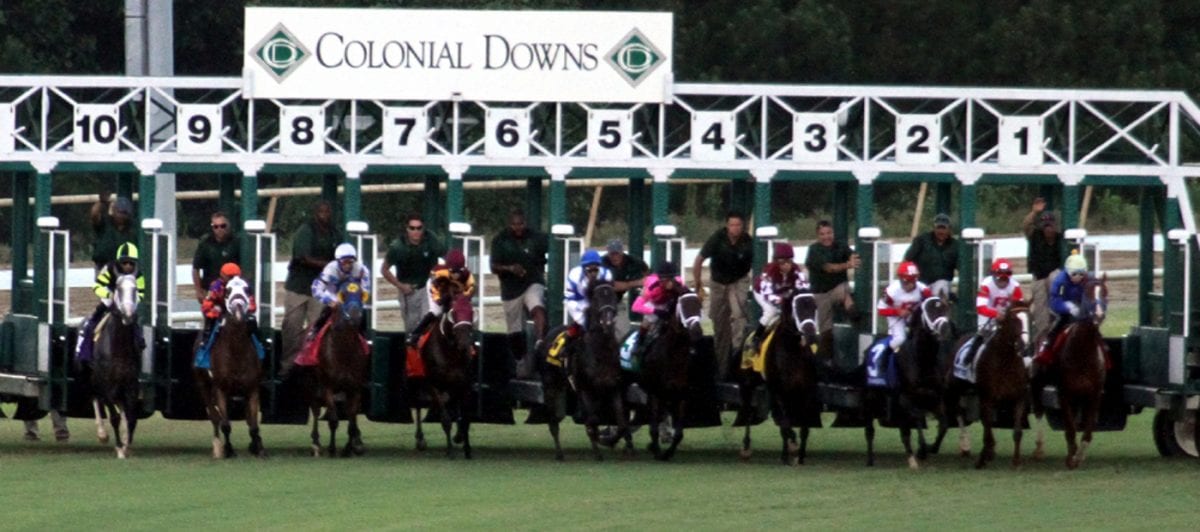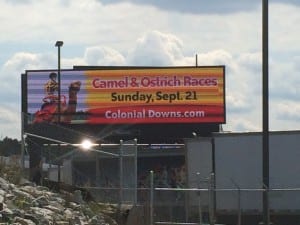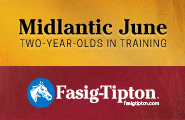by Nick Hahn
Contract or license?
Colonial Downs vowed today to turn in one or the other at the next Virginia Racing Commission meeting.
“This process must come to an end,” said Colonial Downs President Ian Stewart.
At the Commission’s first meeting since May 19, Stewart outlined how the process could end in failure. Unless Colonial’s proposal is accepted by the state’s horsemen, represented by the Virginia Horsemen’s Benevolent and Protective Association (VHPBA), Colonial will ask the Commission to recognize another horsemen’s group, which some deride as a “puppet” organization; that second group would, presumably, be more willing to respond favorably to the track’s proposal. If that gambit were to fail, then Colonial would turn in its license at the conclusion of the harness meet that ends Sunday, October 26.
After learning of the schedule, commissioners asked VHBPA executive director Frank Petramalo for his preliminary opinion of the proposal he received Tuesday afternoon, less than 24 hours prior to the Wednesday morning meeting.
“Not acceptable to me,” responded Petramalo, later recognizing the 10-year-plan as the opening proposal. Petramalo announced that the VHPBA will prepare a counter proposal for Colonial Downs within the several days.
The Colonial proposal reportedly includes 22 days of racing between April and November with stabling only on race days, unless those additional expenditures were paid by the horsemen. At Laurel Park on Saturday, several Virginia horsemen suggested that such a ship-in meet would be unacceptable to them.
Stewart indicated that Colonial would submit its proposal to the Commission by September 24 for what it hopes would be action in October. If, as seems likely, the sides cannot hammer out a late-hour agreement, the VHPBA will is expected to submit its own proposal to the Commission after the horsemen’s group’s board meets on September 23.
“There’s no need to go through the charade of mediation when one of the parties says there’s no hope,” advised commissioner Clint Miller. “The racing business works best when there is a partnership with the state, the track and horsemen. Obviously, we don’t have that today.”
Earlier in the meeting, the Commission vacated its order that reaffirmed Colonial Downs to race 25 days in 2014. The original Commission award of December 2013 to race 25 days in the current year remains in effect.
Wednesday’s meeting was racing’s first under the Secretariat of Agriculture and Forestry, headed by Todd Haymore, who was introduced. Prior to July 1, pari-mutuel horse racing was under the purview of the Office of Commerce.
Colonial Downs opened its harness meet Wednesday afternoon with its signature promotional event being camel and ostrich racing on September 21, more typical of a county fair than a racetrack.
After the summer of racing stagnation at Colonial Downs, the winds of autumn suggest a change in the air. Contract or license? Promise or threat?















Question – if they surrender their license, what happens to the track? Can management be forced to sell?
That’s a good question, and I have been told (but have not verified) that that question is actually a little murky. Let’s see if Nick’ll weigh in.
No, they wouldn’t be forced to sell. While there was time Colonial would have had to surrender the land to the previous owner, Colonial now is the owner outright as I understand it.
Well that stinks.
I’ve made my plans for the Breeders Cup. It’s either California or New York or Bust. Who is this owner of a racetrack, who the heck in Virginia agreed to let this scumsuckeddirtbagschemermobsterruffianbullyfoolidiotmoneygrubberandalltheothernamesinthebook get a license to run a race track. Turn the track to dust, allow the sports book to open with out this eitheryourwithmeoryouareaginstme parsite be in control.
I have a question for Mr.Hahn or someone at the biz. How many members of the VHBPA actually live in Virginia? I am just a now ex-horseplayer mad that my otb is closed. From the outside looking in, it seems the Va horsemen are being led down a path to destruction. I read an article on this website that stated the Maryland horsemen have always been angry that Virginia has the summer race dates. Knowing that, do Va guys really believe the Maryland guys have their best interest in mind? Once they have shutdown the industry in Va they will go skipping back to Md with their 2 or 3 racetracks, their casino funded purses and your race dates. It is difficult not to believe that they had this planned all along. Va can’t be part of a regional circuit when your state doesn’t have wagering and therefore doesn’t contribute to the handle. How long will you be able to run races at Laurel when there is no wagering in Va to replenish your purse acct. I do not know Jeff Jacobs and he may be the scum you say he is. But the fact is he owns the only racetrack here. The state is not going to take his property and no one is coming to build another track. Va horsemen form a group and sign a contract with this man. Get the otb’s open and making money for yourselves and the track. Then after awhile, when everyone has calmed down, you can sit down with the ownership and discuss a future beneficial to both sides. The only alternative is extinction.
HBC – no idea what the percentage is, but it seems like most of the people driving the decisions are Virginia-based. I don’t see the seeming conspiracy among Marylanders to close down Colonial that you imply — more that Va. horsemen don’t believe that CNL’s ideas are sustainable or make sense. Moreover, Va. horsemen have a group — that’s what the VHBPA is
I can remember traveling back home from the NHC finals in Vegas in January. I was so looking forward to meeting up with my friends at the local OTB to tell them all about my trip and get back to wagering. Then came the crash where talks between Colonial Downs and the Horsemen broke down in February and we have been without horse racing since that time. One thing I learned at the NHC was that this game would not even exist were it not for the handicappers and bettors…those of us who live for wagering. Upon retiring, NY track announcer Tom Durkin said the very same thing. It is unfortunate for all of us that Colonial Downs and the Horsemen cannot put aside their own selfish interests to save racing in Virginia! As we have all witnessed the demise of racing in Virginia and the OTBs becoming mere shells of what they used to be, it is clear that Jeff Jacobs and his cronies have overstayed their visit and need to go. Hopefully, this debacle will soon come to an end with new ownership and some renewed optimism for horse racing enthusiasts!
Mr. Hahn I cannot see how you can so forcefully declare the VHBPA is the Va horsemen’s group when you, like me do not know where the majority are from. You are absolutely correct that there is no conspiracy as long as the majority of the group lives in Va. Frank Petralamo stated in an article on this website that any owner/trainer that has run a horse at Colonial is a member of the VHBPA. From watching racing at Colonial for years I know that large numbers of Maryland as well as Delaware and West Virginia horsemen have run there. But it is the Va horseplayers and race fans that are getting screwed by this circus. We deserve a little respect and info on who we are getting screwed by. If Virginia citizens are the majority so be it. In America, you are free to cut your nose off to spite your own face if you wish. Your ex-customers and fans will move on to fantasy football and forget horseracing and you can continue your death march towards extinction. So the all important question, that no one seems to be able to answer, remains. Do the majority of the VHBPA members actually live in Va?
hbc, it doesn’t matter what state the members of any horsemen’s association are domiciled in. The membership qualification is that you have run horses in the state. So while I might live in Virginia, by default I am a member of the Maryland horsemen’s association. The fact that I live on the far side of the Potomac doesn’t make my concerns about how Laurel and Pimlico run any less, nor my membership in the Maryland horsemen’s association any less legitimate.
Jacobs and crew have been terrible owners of Colonial Downs. I hope they make good their threat and surrender their license to stage thoroughbred racing in Virginia. It would be to the gain of everyone connected to the horse business in Virginia if they did.